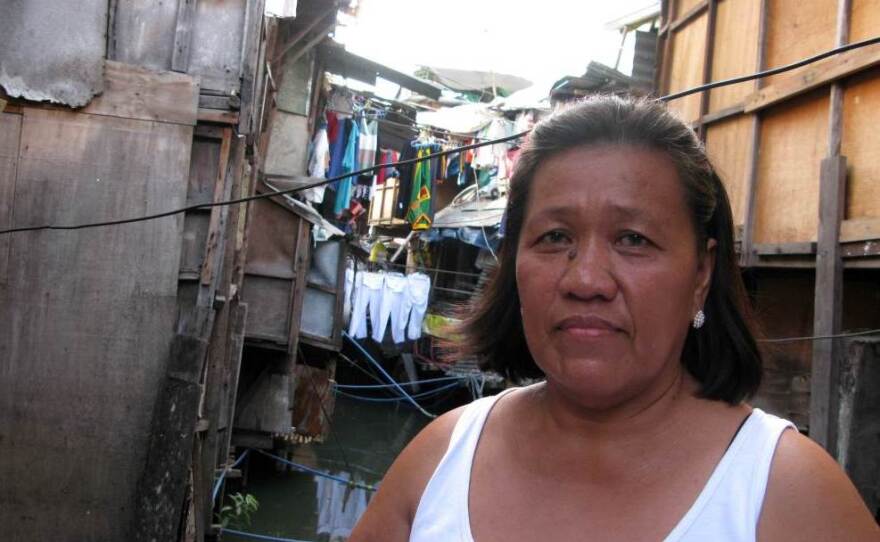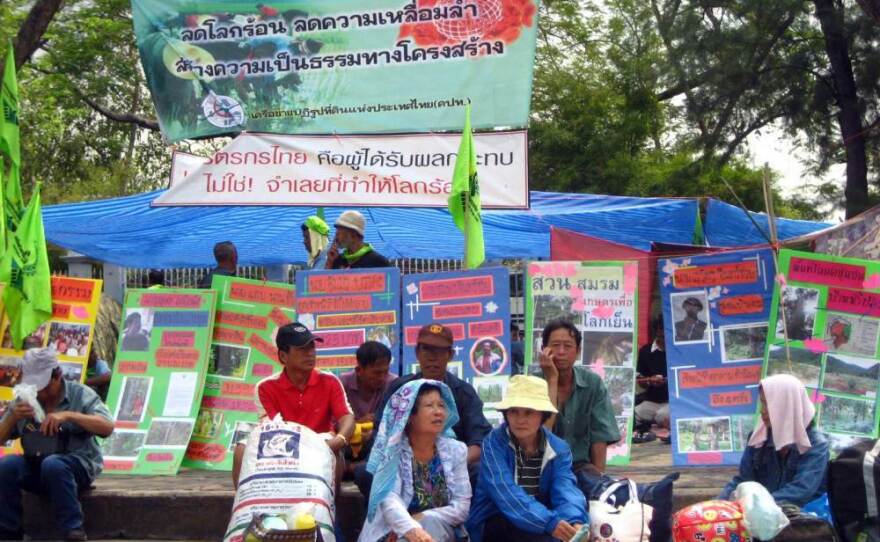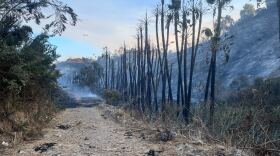Fast economic growth in many countries often carries a high price for some of the poorest residents: Vast slums are cleared by urban planners and commercial developers, sometimes by force.
But there's a growing international movement of activists who are fighting for slum-dwellers' housing rights.
Phnom Penh: A Rising Lake
Workers are pumping sand and water into Phnom Penh's Boeung Kak Lake in the heart of the Cambodian capital. Residents say developers are doing this to force them out of their ramshackle homes in exchange for minimal compensation.
Glassmaker Cham Phutisak looks helplessly at the mud gushing toward his house.
"We residents are living through great difficulties now. The sand and water are flooding our homes," Phutisak says. "We are afraid we might be electrocuted in the water or bitten by poisonous insects."
Residents say the developer behind this project is a senator from the ruling party, backed by Chinese investors. Community organizers have lobbied the U.N. and launched protests in Phnom Penh and at Cambodian embassies overseas. In recent weeks, protesting lake residents have clashed with riot police.
But activist Tuol Srey Po says it's hard to unite the frightened residents. She's part of a loose alliance of nongovernmental organizations called the Four Regions Slum Network.
"Some people are afraid of joining our network. They moved away, feeling our efforts were as futile as trying to break a rock with an egg," Po says. "Cambodia has only just recovered from civil war, and they don't want to face death again."
Manila: Slum Dwellers Want Autonomy
In the capital of the Philippines, neighbors chat and children play as the fetid green waters of the Estero de San Miguel flow by their shacks. Community organizer Filomena Cinco shows visitors around.
"Around maybe 200 meters from here is the passage to Malacanang Palace, where our president lives," Cinco says. "That's why the government wants this community to be demolished and be relocated in a far, far place."

The government also wants to clean up the estero, or canal, to prevent flooding. But residents don't want to move, says Cinco, because their jobs are here. The community has hired architects to draft renovation plans for the neighborhood. Cinco says that if the government approves the plan, the community will come up with funding.
"There are slum dwellers who really want to develop themselves, to upgrade their places," Cinco says. "The slum upgrading is the best for them because they know what they want and let the people decide what is best for them."
Denis Murphy, executive director of the NGO Urban Poor Associates, has lobbied Philippine President Benigno Aquino III, who has declared a moratorium on demolishing the slum.
Murphy says activists here are inspired by the tactics of Saul Alinsky, the activist who organized Chicago's slums in the 1930s. He says the slum dwellers carry a clear political message for city hall.
"Look, we are hundreds of thousands of urban poor people here, squatters," he says. "If we're on your side, governing the city is much easier. If we're the enemy, you'll have no end of problems.
"Every time you want to do something, we'll oppose it."

Bangkok: A Transitional Period
In Thailand's capital, Bangkok, farmers and slum dwellers are camped out in front of the old parliament. There are so many demonstrations going on, it's hard for this group to find an empty street corner.
Nutchanart Thantong, a Four Regions Slum Network activist, says the upcoming Thai elections present her group with an opportunity to press its cause.
"At the moment, it's a transitional period and it's a good time to inform the current government that if they don't solve the problem, they surely won't get our vote," Thantong says.
Civil society groups, fighting to make sure development does not come at the expense of the poor, may be taken for granted elsewhere. But their survival has been hard won under authoritarian and post-authoritarian governments in Southeast Asia.
Copyright 2022 NPR. To see more, visit https://www.npr.org. 9(MDAzMjM2NDYzMDEyMzc1Njk5NjAxNzY3OQ001))







